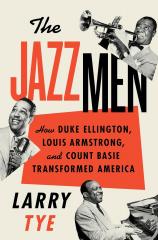Interview: July 11, 2024
Larry Tye’s THE JAZZMEN is a sweeping and spellbinding portrait of the longtime kings of jazz --- Duke Ellington, Louis Armstrong and Count Basie --- who, born within a few years of one another, overcame racist exclusion and violence to become the most popular entertainers on the planet. In this interview conducted by Michael Barson, Senior Publicity Executive at Melville House, Tye explains why he chose these three iconic figures as the subjects of his book, how he approached the process of doing original research into their lives and times, and why he believes that jazz is here to stay.
Question: Duke Ellington, Louis Armstrong and Count Basie indisputably form the holy trinity of 20th-century American jazz royalty. Was there ever a point in the book’s formative stage when you were considering a fourth figure?
Larry Tye: I had recommendations for fourth figures from America's smartest jazz musicians and critics, who suggested everyone from Miles Davis to Dizzy Gillespie and Billie Holiday. None, however, had the critical common elements of my big three --- from being born within five years of one another at the end of the last century to staying center stage for a full half of that century.
More to the point, my own experience and my reading of other group biographies suggest that three subjects is the most any reader wants to follow in a single book.
Q: Given that these famous artists had various books written about them over the years, not to mention their own memoirs, how did you approach the process of doing original research into their lives and times? And was there one figure of the three who ended up being more difficult to research?
LT: My book differs from the 100, or perhaps 1,000, that came before in one critical way: they focused on these maestros' lives on their bandstands, while mine zeroed in on their lives off. I wanted to know the non-musical legacies they left, and how they influenced human rights and civil rights. And I wanted to know what life was like on their rough road trips during the era of Jim Crow segregation, and about their faiths, home lives and money issues.
The hardest to pin down was Count Basie because he was, by design, the most secretive. The reason for that, my research suggests, is the shroud of secrecy that surrounded his own childhood, and I came away understanding the Count in ways I hadn't dreamed possible and that even those who thought they knew him might find astonishing.
Q: You describe the many negative critiques Louis Armstrong received about his public persona while performing in films and on television over the course of his career, and show how he fended them off at the time. Would you say this remains an issue all these years later when examining the impact of Armstrong’s public face?
LT: Yes, to too many, Louis Armstrong was an Uncle Tom or perhaps an Aunt Jemima. That image wasn't just wrong, it ignored his wit, his temper and a lifelong conviction that Black is beautiful that belied the stereotypes and puts him at the forefront of civil rights pioneers.
Q: If it’s true that your three superstar subjects here “transformed America” with their music --- and I believe that is not open to argument --- what do you feel the odds are that there will be three figures in 21st-century music who will be able to do the same?
LT: I can only hope. I also hope that --- with everyone from Bob Dylan to Paul McCartney, John Batiste and Wynton Marsalis saying they owe huge debts to Ellington, Basie and Armstrong --- these modern-day musical icons will learn the importance of using their megaphones to speak out on issues that matter, and where they can matter.
Q: Speaking for myself, one of the most surprising revelations in the book was learning that the elegant Duke Ellington --- the personification of Cool --- was a major hypochondriac. What trait became the biggest surprise to you in the course of researching these three legends?
LT: I was surprised that all three maestros had so many addictions and afflictions --- from Duke's superstitions (he was afraid of airplanes and boats, anything green or brown, or gifts of slippers or socks, which he felt risked the recipient ending the friendship), to the Count's passion for the ponies (his gambles seldom paid off), to Louis' passion for marijuana (he started every day by rolling a fat joint in the bathroom and ended by rolling another in his dressing room). All three were philanderers and adulterers, cavorted with gunslingers and mobsters, and gave too little credit to their sidemen and women.
In the end, however, those foibles made these men more fully dimensional, if less virtuous, and more able to understand their imperfect listeners even as they were less likely to preach to them.
Q: Looking at the state of jazz in 1924 (100 years ago) and its presence on the music landscape of 2024, how do you feel it is likely to endure as our century rolls on?
LT: Past forecasts of its demise were wrong, and I feel confident that current and future ones will be, too. Jazz is too all-American, too rollicking and toe-tapping, and too improvisation and ever-evolving to go away for long.




